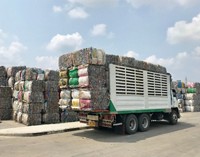Advertisement
Grab your lab coat. Let's get started
Welcome!
Welcome!
Create an account below to get 6 C&EN articles per month, receive newsletters and more - all free.
It seems this is your first time logging in online. Please enter the following information to continue.
As an ACS member you automatically get access to this site. All we need is few more details to create your reading experience.
Not you? Sign in with a different account.
Not you? Sign in with a different account.
ERROR 1
ERROR 1
ERROR 2
ERROR 2
ERROR 2
ERROR 2
ERROR 2
Password and Confirm password must match.
If you have an ACS member number, please enter it here so we can link this account to your membership. (optional)
ERROR 2
ACS values your privacy. By submitting your information, you are gaining access to C&EN and subscribing to our weekly newsletter. We use the information you provide to make your reading experience better, and we will never sell your data to third party members.
Persistent Pollutants
Governments endorse global PFOA ban, with some exemptions
Restrictions placed on firefighting foam with PFOA, PFOS, or both
by Cheryl Hogue
May 6, 2019

A widely used industrial fluorochemical that is linked to cancer and pollutes drinking water around the world is on its way to a global phaseout.
More than 180 countries agreed May 3 to ban production and use of perfluorooctanoic acid (PFOA), its salts, and PFOA-related compounds under the international Stockholm Convention on Persistent Organic Pollutants (POPs). The International Agency for Research on Cancer considers PFOA possibly carcinogenic to humans. Exposure to the substance is also linked to hormonal disruption.
At a meeting of Stockholm Convention treaty partners in Geneva, governments carved out exemptions that allow some applications of PFOA to continue, including use in fire-fighting foams—a practice that has contaminated groundwater in many areas around the globe. Tons of these foams are in storage, at the ready to help first responders douse petroleum-fueled fires. Some of these foams also contain another fluorochemical, perfluorooctanesulfonic acid (PFOS), which has been tightly restricted but not banned under the Stockholm Convention for a decade. At their recent meeting, treaty partners agreed to ban the use of firefighting foams containing PFOA or PFOS in training exercises and to prohibit the production, import, or export of foams with either or both chemicals.
The chemical industry group FluoroCouncil has pushed for a transition away from PFOA to modern fluorinated chemicals that have “enhanced human health and environmental profiles,” says Jessica Bowman, the organization’s executive director. “Listing PFOA under the Stockholm Convention with minimal exemptions will help further this transition globally.”
Governments created an exemption for use of a PFOA-related chemical used to produce pharmaceuticals, says Pamela Miller, cochair of a coalition of public interest groups, the International POPs Elimination Network. The substance is perfluorooctyl iodide, which can degrade to PFOA. It is used to produce perfluorooctyl bromide, which is a processing aid in making some pharmaceuticals. Although the exemption for perfluorooctyl iodide will expire no later than 2036, treaty partners will review it and could potentially eliminate it before then, Miller tells C&EN.
Treaty partners also gave global, five-year exemptions for PFOA and its chemical cousins used in semiconductor manufacturing, worker-protection textiles, medical devices, and photographic coatings on films. They granted additional PFOA exemptions to China, the European Union, and Iran for PFOA use in production of fluoropolymers, medical textiles, and electrical wires.
In addition, governments reduced the number of uses allowed for PFOS, its salts, and a related compound, perfluorooctane sulfonyl fluoride, under the Stockholm Convention. They eliminated exemptions for these substances in aviation hydraulic fluid and other specialty applications. However, they allowed use of the pesticide sulfluramid, which degrades into PFOS, to continue with no deadline for phaseout. Applied to control leaf-cutting ants, the insecticide is made in Brazil and used across Latin America and the Caribbean, causing PFOS pollution.
“The continued use of sulfluramid in agriculture with no time limit protects Brazilian chemical companies, not human health and the environment,” said Fernando Bejarano of the International POPs Elimination Network Hub for Latin America and the Caribbean.
The US has signed the Stockholm Convention and attends negotiations related to the pact, but it is not an official treaty partner.
UPDATE
This story was modified on May 7, 2019, to add comments from FluoroCouncil.





Join the conversation
Contact the reporter
Submit a Letter to the Editor for publication
Engage with us on Twitter